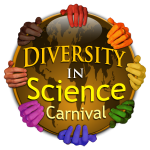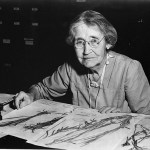women in science
Remember Bill Nye the Science Guy, that television popularizer of science for kids? Maybe it's time to give him an update and a facelift. That's the goal of Susan the Scientist, a project of Dr. Susan Reslewic, who is launching a new blog, myspace, and youtube presence to (in her words):
teach 'citizen science' to kids and curious adults using music and objects in our local households to conduct simple experiments online. The idea is to make science both hip, simple, and most importantly fun. We hope to build this project and message making this available, free online this coming year.
Here's…
A few days ago I wrote about The Problem of the Problem of Motherhood in Science, a post inspired by Meg Urry's book review of Motherhood, the Elephant in the Laboratory by Emily Monosson. A vigorous discussion ensued in the comments - thank you all for participating! It turns out the author of the book was paying attention, and she contacted me by email. Emily Monosson told me she feels her book was misrepresented in Meg Urry's review. I agreed to post here the contents of her email to me.
Here's the email:
I am writing, as editor of Motherhood the Elephant in the Laboratory, in…
This month's Scientiae is about overcoming challenges: our worst moments, and how we survived them. I've had trouble deciding which story to tell. Field camp? Running out of food while dropped off by helicopter? Not finding the rocks that were supposed to be in my dissertation field area? Bad dates (geologic, that is)?
I had some disastrous fieldwork in grad school, yeah, but I think my worst experience came from teaching. In fact, my teaching lost me a job. But I'm getting ahead of myself...
I was hired at the last minute for a one-year replacement position at a small liberal arts college in…
Mary Ann Mason has a column in this week's Chronicle of Higher Education describing the importance of role models and mentors for women graduate students. Though Zuska recently wrote a provocative post that argued that "the problem of motherhood" might be a red herring for those interested in increasing the representation of women in science, Mason's column provides some data that suggest the problem of motherhood is very real.
Role models, particularly ones with children, can make the difference in whether a female graduate student takes the next big step along the tenure track. While…
It's here! The second edition of the Diversity in Science Carnival! But it wouldn't be here today without the help of Dr. Free-ride and Dr. Isis. With all the time I have had to devote to my mother and her issues the past two weeks, there is no way I could have gotten the carnival up today without their help. Indeed they really get full credit. I haven't even managed to finish a special post I wanted to do for the carnival - so check back later. I'll update when I have it done and add it in here.
But enough of my travails! Let's get on to the really good stuff submitted to this…
Geologists are quirky and interesting. We study this planet we live on (and others), we get to think about volcanoes or earthquakes or landslides or floods, we can tell you a gazillion ways that the earth could kill you (and then say that they'll all happen tomorrow... on the geologic time scale). We know how water flows through rock. We know how oil flows through rock, too, and what's likely to happen if we keep burning oil and coal and natural gas. And our employment prospects look good (though again, remember we think on the geologic time scale, and mega-recessions are too short for us to…
It's Women's History Month, and the Diversity in Science Carnival has asked us to profile women scientists. I spend a lot of time thing about the things that affect the lives of today's young women scientists, but I also know that we are preceded by some incredibly strong and brave women who faced much tougher working conditions than we. And some of those trail-blazing women in science were young not that long ago. So I'm taking this post to talk with one of those amazing women and see what has changed and what hasn't.
Over the course of two hours, I had a wonderful conversation with this…
Calls to arms:
Chris at goodSchist is looking for help to work on the wikipedia page on the mantle. Since he posted, some people have taken on the challenge, but someone who thinks the mantle is too cold to convect is arguing that the revisions violate wikipedia's neutral point of view.
Eric at Eruptions wants to see who can write a better volcano description than FEMA. It can't be too difficult. (In fact, this would be a good assignment to give to a class, I think.)
Maria at Green Gabbro notes that wikipedia's women in earth science category is "underpopulated." If you run across wikipedia…
The Smithsonian Institution has made available on Flickr an amazing set of photographs of early women scientists and engineers.The pictures include women who worked at the Smithsonian and images from the Science Service Archives now housed at the Smithsonian. Some of these women scientists are well-known, even Nobel laureates, while others worked in obscurity. Some used their scientific training and passion to do research, some to save lives as doctors and nurses, some to write about science, some to break the sound barrier, and some to advance the cause of women. To me, all of them were…
A couple weeks back, I composed a post entitled 'Science Reveals How To Lose Weight And Keep It Off'. The results weren't surprising... research out of Harvard found that calories are the most significant part of the equation. However, what really resonated with a number of readers turned out to be a different topic related to this point:
Weightwise, my take is that we humans have an interesting habit of coming in all shapes and sizes and the most beautiful tend not to fit a particular mold. That said, being healthy--inside and out--is everything.
I received several emails in agreement, and…
From the Association for Women Geoscientists' e-news:
The deadline for applications for the 2009 AWG Chrysalis Scholarship has been extended to March 31st.
The Chrysalis Scholarship provides degree-completion funding for women geoscience graduate students whose education has been interrupted for at least one year. The awards are intended to cover thesis/dissertation costs such as typing or drafting expenses, child-care, or anything necessary to assist a degree candidate during those critical, final days.
More information and instructions on how to apply are available on the AWG website at…
My other half and I are both working from home today. I'm revising the first draft of a paper that I'm working on, and he's doing remote network engineering. Last time I sat down with this paper, I realized that, if I plotted my data in a certain way, I would be able to see whether it really did match my model for what's going on. I looked at it again today, and yes, it really is the perfect way to make the argument.
I was so pleased that I needed to share it. So I showed it to my husband. And then I tried to explain what I was modeling. After several versions of the explanation, he had a…
A semi-coherent point-by-point reply to the nearly incoherent, yet overwhelmingly disturbing, musings of Greg Laden on the subject of women scientists in the field. SIWOTI alert.
If you don't understand why many of us get so riled up by Greg Laden here's a snippet that should help explain things:
"That is, indeed, what every scholar needs: A wife (or two) who knows how to type, edit, wield a caliper, and still have time to do the grocery shopping, have lunch ready at noon, and give birth to and raise the kids."
The point-by-point takedown of the rest of Laden's post is below the fold.
The…
The blogosphere is buzzing over the new middle school aged Dora The Explorer because of her recently released silhouette.
Over at Packaging Girlhood, Lynn and Sharon suggest:
If the original Dora grew up, she wouldn't be a fashion icon or a shopaholic. She'd develop her map reading skills and imagine the places she could go. She'd capitalize on those problem solving skills to design new ways to bring fresh water to communities in need around the world. Maybe she'd become a world class runner or follow her love of animals and become a wildlife preservationist or biologist.
Wait... what?! We'…
Guest post from Female Seaside Scientist, for the Diversity in Science Carnival!
Dr. Cindy Lee Van Dover is a Professor of Marine Biology, Director of the Duke University Marine Lab, and Chair of the Marine Science and Conservation Division at the Nicholas School. Her research combines biogeochemistry, biodiversity, ecology of chemosynthetic deep-sea vent organisms, marine technology, and astrobiology.
Faculty page here; research page here; cv here.
More after the jump
Professor Van Dover had an early fascination with Jules Verne's Captain Nemo character from the "20,000 Leagues under…
I'm off to the city for a panel in recognition of International Women's Day. Given the theme, I'd like to point readers to a recent piece from The Guardian asking 'Where are the books by women with big ideas?'
Books like Freakonomics, defining significant cultural or economic trends with a punchy title, never seem to be produced by women. But why?
As you can imagine, I have much to say on the topic coming soon, but am first interested in your reaction to the article. Here's an excerpt to get us started:
Julia Cheiffetz, blogging at publishing website HarperStudio, dubs the genre "big think…
On Monday, I'm delighted to be attending a panel discussion in honor of the 2009 International Women's Day celebrations! This global holiday celebrates the economic, political, and social achievements of women past, present, and future. Here in NYC, the World Policy Institute, the Women's Leadership Initiative at Demos, and The American-Scandinavian Foundation have organized:
The Hillary Effect: How Will the Secretary of State Change the Status of Women Worldwide?
Though Mrs. Clinton is the third female US Secretary of State, some think that her appointment could herald a new…
In 1992, a small group of 12 and 13 year olds from the Environmental Children's Organization (ECO) raised money to attend the Earth Summit in Rio de Janeiro. This is Severn Suzuki's address to delegates.
Nearly early two decades later, her words are as relevant as ever. Are we doing any better?
One of my favorite bloggers, with one of the best blog titles ever, has drifted on over to ScienceBlogs. Kim writes beautifully about geology and geosciences education, and occasionally about women in science. She guest blogged for us a few weeks ago, and now she's got her own well-deserved brighter spotlight.
If you are not yet reading All My Faults are Stress Related, you should be. Here's a snippet from a recent post to whet your appetite:
[M]y suggestion for the "100 great geologic places" list might surprise you:
Your own backyard. ...
But I'm serious. Every place has geology. Even if it…
Wow. You all rock. You are good at so many wonderful things - I am impressed.
Yesterday's question was prompted by the introductory activity at a COACh workshop that I had the privilege of attending. The workshop focused on developing the negotiating skills of women in STEM, and I highly recommend it and the other workshops they offer.
After coffee and bagels, our facilitators asked us to stand up and introduce ourselves to the group by saying what we were good at professionally. And then they showed us how our answers were weak and could be improved.
Here's my response: "I think I'm good…

